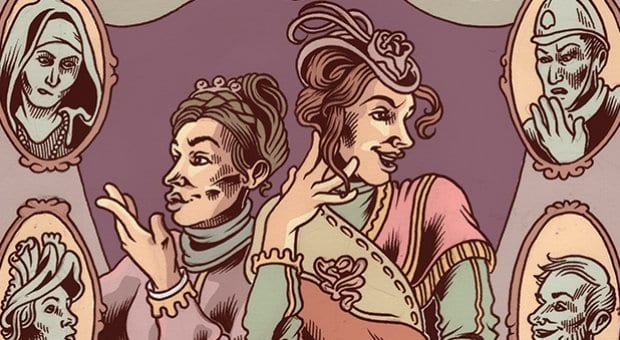A quarter century before the infamous trial of Oscar Wilde, London’s courts saw a case of an equally theatrical bent. In 1871, Ernest Boulton, the son of a stockbroker from the London suburbs, and his dear friend Frederick William Park, a young law student, found themselves in court for “conspiring and inciting persons to commit an unnatural offence” — that offence being sodomy. Who could expect anything less of the performers known as Stella (Star of The Strand) and Fanny?
Boulton had shown a talent for performing as a woman from a young age, using the nickname “Stella.” He was apparently encouraged by his mother. He was often cast in the lead female role in private performances at the country homes of family friends; unsurprisingly, later photographs reveal a young man with soft, androgynous features. Park, on the other hand, had a round, homely face, a dead ringer for an older Queen Victoria in a royal drag farce. He was the son of a master of the superior court, the youngest of 12 children (including a brother arrested for homosexual offences) and worked in the office of a London solicitor.
In their early 20s, Stella and Fanny found in each other a bosom friend and someone to share the stage with; they might also have been lovers. They performed in melodramas and operettas, which were very popular. A third player in their theatrics was retired navy officer Lord Arthur Pelham-Clinton. In an 1868 show called Love and Rain, Pelham-Clinton played Stella’s husband, a role he doubled in outside the theatre, to the point where Stella often called herself Lady Clinton.
Performances unabashedly spilled into the streets of London, and Stella and Fanny attended theatre events, the Oxford and Cambridge boat race, and the Burlington Arcade (a haunt of higher-priced prostitutes) in tight pants, low-necked shirts and powdered faces, and sometimes in full drag. They publicly courted men, possibly for money, but probably more often for the male attention. The night of their arrest, in 1870, was illustrated in a morally indignant report entitled “Men in Petticoats”:
“It appears that … no little excitement was caused in the Strand Theatre by the entrance of two very handsome young women, accompanied by a young gentleman, into one of the private boxes, in fact, the personal charms of these ladies were so great that they attracted general attention . . . The general opinion throughout the house being that they were two fresh stars about to shine in the firmament of the demi-monde, and that their beauty, their fascinations, and their paid for smiles, would, before the London season expired, cause many a poor dupe to curse the hour in which he had been born.”
This anonymous reporter didn’t proselytize against homosexuality; instead, he was horrified that, when Fanny’s lace came unpinned, she entered the women’s washroom so the attendants could help fix her outfit. Unfortunately, Franny and Stella’s performances beyond the stage had already attracted the attention of the metropolitan police, who had had them under surveillance for a year before apprehending them.
Soon after the arrest, news came of the death of Pelham-Clinton — either from scarlet fever, compounded by stress from seeing his name connected with the arrest, or by suicide. A third possibility is that he fled England to avoid persecution, with news of his death masking the disappearance.
In May of the following year, Stella and Fanny came before the court, though the prosecution’s case was flimsy and didn’t use medical evidence to prove sodomy had occurred. Audiences at the trial were thrilled by the parade of crossdressing witnesses and the evidence presented. Crossdressing technically wasn’t a crime, and Boulton’s mother testified that his dressing habits had always been accepted. The court aquitted the duo; Stella fainted in the courtroom at the announcement.
The two eventually travelled separately to America, under aliases. Park moved to New Jersey and died at the age of 33, possibly from syphilis. Boulton, under the surname Byne, continued to perform in drag on the New York stage. A plaque now installed on one of their former residences says Boulton survived scandal and the death of his loved ones and lived to the age of 57.
Neil McKenna’s Fanny and Stella: The Young Men Who Shocked Victorian England was published in North America earlier this year. It’s available at Glad Day Bookshop, 598 Yonge St.


 Why you can trust Xtra
Why you can trust Xtra


